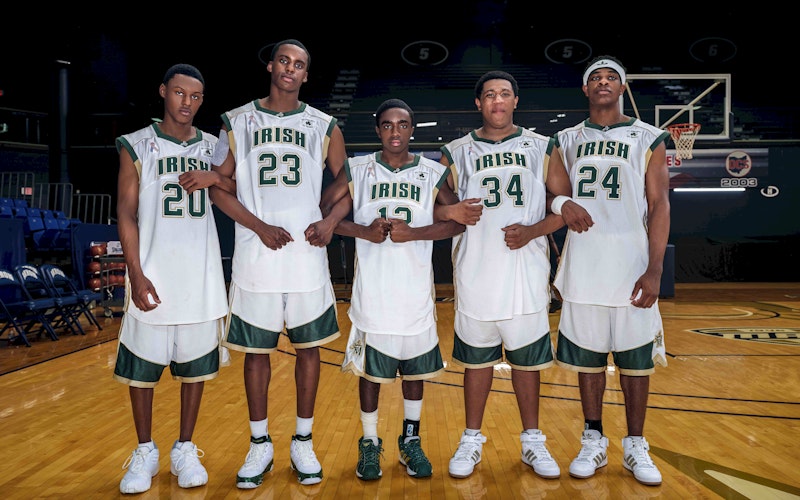
Movies
Shooting Stars and Sharing the Spotlight
It's fitting that shortly after we get a Michael Jordan biopic of sorts, Air, there is a movie about the only other athlete in the conversation for greatest basketball player of all time: LeBron James.
Shooting Stars, directed by Chris Robinson and based on the autobiography James wrote with Buzz Bissinger, focuses entirely on James' high-school career. The film breaks the biopic formula by centering James’ four teammates. The film offers a provocative picture of what manhood and success look like, a picture that mirrors the Apostle Paul’s metaphor of the body of Christ.
As the film opens, we meet young LeBron (Mookie Cook) and his three best friends: Lil Dru (Stranger Things' Caleb McLaughlin), Willie (Avery Serell Wills, Jr.), and Sian (Khalil Everage). As they look forward to their freshman year of high school, Lil Dru learns that the coach at the public school plans to play him on the JV team (he’s significantly shorter than his friends). In order to keep them together and on the varsity team, Lil Dru convinces the coach of the private Catholic school (Dermot Mulroney) to give all four boys scholarships. A terrific subplot involving enemy-turned-teammate Romeo (Sterling Henderson) rounds out the Fab Five, as the boys called themselves.
Since this is a biopic about one of the all-time greats, watching James win game after game isn’t surprising. Yet his total dominance on the court is still impressive. Robinson's direction is stylish and slick, making the games thrilling and taking full advantage of the fact that several of the young stars are no slouches on the court themselves.
In most biopics, fame brings conflict. Shooting Stars is no exception, though it still manages to subvert the formula. Instead of showing us a LeBron James who dives into sex and drugs, we see a young man struggling to navigate the national spotlight. He shows romantic interest in exactly one woman, Savannah (Katlyn Nichol), whom he eventually marries. In fact, the biggest toll fame takes on young James is that it nearly costs him his closest friendships.
It's Lil Dru in particular who struggles to grow up in James' shadow. In one early game, the coach tells Lil Dru to pass the ball to other players. Instead, Lil Dru sinks three pointer after three pointer himself, McLaughlin twisting his mouth into a grin of defiance as he scores a final, game-winning bucket. McLaughlin embodies a young man who both loves the well-deserved fame coming to his friend and laments the growing realization that he will never share it.
The film breaks the biopic formula by centering James’ four teammates.
Lil Dru's bitterness echoes the competitive divisiveness that the house churches in Corinth experienced. In his first letter to the churches, Paul chastises them for how they conduct their worship. While they have embraced the many and varied gifts of the Holy Spirit—from prophecy and teaching to speaking in tongues—the church has become divided. Some sort of hierarchy has developed, with some gifts prized above—and lorded over—others. Paul writes: “There are different kinds of gifts, but the same Spirit distributes them. There are different kinds of service, but the same Lord. There are different kinds of working, but in all of them and in everyone it is the same God at work." From here, he launches into his famous metaphor of the body, insisting that every member is equally important because together we comprise one body.
There's no such thing as a GOAT (“greatest of all time”) in the kingdom of God. Shooting Stars interrogates whether that narrative matters in the NBA. Bring up Michael Jordan and it won't be long before someone reminds you that he had Scottie Pippen, Dennis Rodman, Phil Jackson, and the rest of the Chicago Bulls to raise him up. James has been insistent for years (at least since publishing Shooting Stars in 2009) that he owes much of his success to his friends and several adults in their lives, including Coach Dru Joyce II (Lil Dru’s father, played by Wood Harris) and James' mother, Gloria (Natalie Paul).
Shooting Stars centers these relationships. When the credits roll, we’re treated to the traditional text telling us what became of these young men, as well as pictures of the real men. In one of the better feel-good moments in recent memory, we learn that each man had a cameo in the film as well, before closing on a shot of the Fab Five and Coach Dru in present day. It’s a warm affirmation of authentic friendship among adult men, as well as a powerful de-centering of a man who rightfully deserves the spotlight in which he’s found himself. What would our churches look like if we took a page from King James and emphasized not the sages on our stages, but the tireless faithful who will never make a Greatest Of All Time list?
Topics: Movies